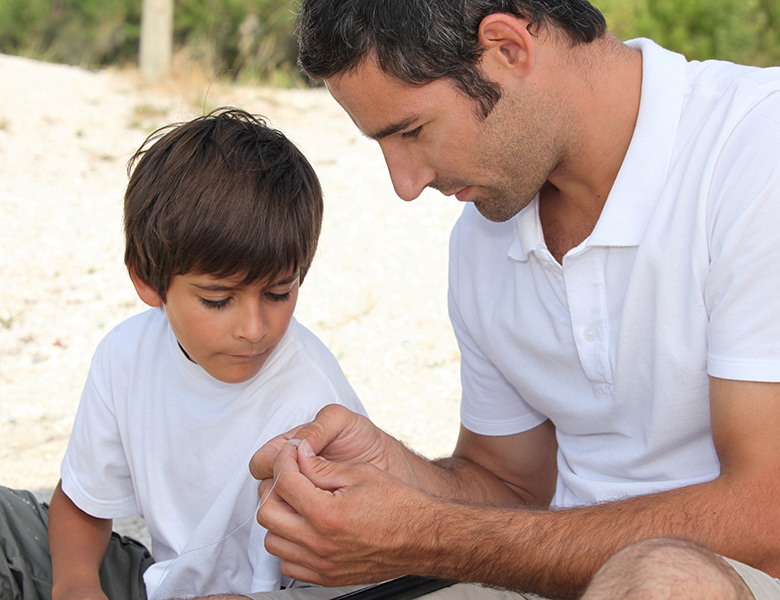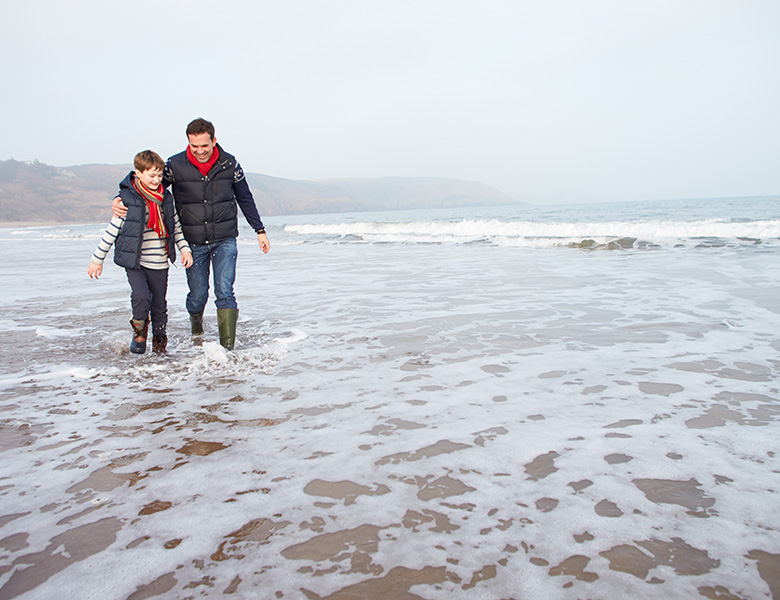Mindful Parenting, Mindful Fathers
I want to speak to all of you fathers out there, dad to dad. (Mothers, you may interested in reading this as well, even though my emphasis here is to address the particular and important role that men play in the lives of their children, something that is important not only on the individual but also the societal level.)
The greatest gift we can give anyone, especially our children, is that of being fully present.
Why is our presence so critically important? What is it about bringing ourselves fully into the moment with our children that feeds the soul – theirs and ours?
The answers lie in the fact that one of the most important human needs is to be heard, seen, known and appreciated. This is how we make a key difference in cultivating qualities such as self-esteem, generosity and compassion within young minds and hearts.

Research in the fields of psychology, sociology and neuroscience all confirm the importance of caring touch and loving connection. Babies, after all, are completely vulnerable to the nurture – its presence or absence – provided by their caretakers. The way they are touched, the tone of voice used, the level of safety in their environment and the nourishment that is provided, these all develop not only a child’s physical but also his or her emotional, energetic and psychological states.
“I am here,” are some of the most comforting words a person can hear in moments of crisis, pain, doubt, fear and sorrow.
This is especially the case when the support comes from someone that is well known and loved. I have raised three children, now all young adults and one with children of his own. I would like to think I have been the kind of father each would turn to in a time of need – for support, comfort, and unconditional love.
Paternal wisdom gained from a lived experience is worth sharing.
Here are five (5) practices for fathers that enrich and grace our children as well as our selves:
- Coming Fully Present
- Time Rituals
- Imaginative Play
- Modeling Vulnerability
- Sharing our Work in the World
Children are a great paradox, both delightful and a trial by fire. When they are little, they delight us with the radiance of their unadulterated joy in life, the comfort of their unconditional love, and the amazing vulnerability of their trust. They also challenge us, pushing us beyond the edges of our comfort zones.
They do this when tiny by being unutterably themselves with no excuses: messy when we want order and demanding in terms of their needs and desires, without consideration of our carefully planned schedules and routines. All of this long before their pre-teen and teenage years as they seek to individuate and when challenges become geometrically greater!
To be a dad is to live in rotating states of bliss, fear, love, anger, deep contentment and great disturbance.
My wife Christine and I have now successfully raised three incredible children to young adulthood, our youngest just now getting ready to turn twenty-three. The experience has been both wonderful and humbling. Thus far it has been a journey through an wide range of emotions: exasperating, joyful, infuriating, loving, comforting, terrifying, uplifting, depressing, clarifying and, at times, confusing!
It is never boring!
Our children challenge us to develop greater patience and awareness. In addition, I’m pretty sure that teenagers are one of God’s ways of teaching us humility!
Men who are fathers (and for that matter, mothers with careers outside the home) face the additional challenge of staying connected to their children (and spouse) while also having their attention demanded by the work they do out in the world.
For example, I traveled quite a lot for work as an organizational and leadership consultant. I felt the keen sense of loss and pain when, during a phone call to the family, one of the children would at some point inevitably cry out, with either a plaintive tone or one of anger, “Daddy, COME HOME!”
It tore at my heart, and I also experienced guilt and a deep longing. The insights of Robert Bly’s book Iron John and the inspirational poetry of David Whyte were extremely helpful to me at this stage.
Both of these men spoke to the requirement, the need, the challenge and the gift of being “present,” with our selves and with our significant others. The importance of the quality of the communication we engage with them. These insights turned into a set of practices that fed the hearts of my children, my spouse, and joyfully, my own.
Presence Practice #1: Coming Fully Present
Bringing our selves fully to the moment means making eye contact, letting go of the agendas of work and the demands of the world and focusing fully on the being that is before us.

Something I find particularly helpful in letting go of my mind’s preoccupation (with client problems, assorted worries and a ever-present long list of “should’s” and “to-do’s”) is to focus on my breathing. Yes, it is as simple as slowing down and consciously noticing my breath, slowing it down and even working to bring it into synch with the person before me.
During early fatherhood, this allowed me to slow down and remember that there was no greater value I could offer than to let my daughter or son know that I was really there with them. “I am here, now,” was something I would say at least to myself.
My eye contact, my slowed breathing, and the softening of my tone of voice helped to make the connection, the communication between us even stronger. From that space I then focused on really “listening” to my child, listening to what was not being said as well as what was being said and what was being felt. In this way, I did my best to show that there was nothing more important than being there, together.
Presence Practice #2: Time Rituals
Making time is essential to our being really present as dads.

Rituals are very important and helpful in creating the connected space to be fully “with” the kids. Rituals such as: nightly bedtime stories, whether face-to-face or over the phone; the preparation of weekend breakfasts together (especially pancakes!); and for each child, one-on-one, a monthly “special time with dad” such as going out for a treat, meal or activity.
The important thing to mention here is that it is not the amount of time we spend, but the quality of it that matters. It can be as simple as taking one or two minutes for a careful look at a picture your child has drawn and wants to show you. It could be a daily practice at dinner meals listening to each child’s sharing about their day.
Again, the gift is our presence, in the present.
Presence Practice #3: Imaginative Play
Playing and gifting with imagination is another way to make your presence truly felt.

I made it a practice to create stories for my children that incorporated interests they had shared with me, populated with characters they grew to love and wanted to know more about, like Mustafa the mustached mouse.
These stories could incorporate gentle lessons and be used to help make sense of challenges in my children’s lives. Also, whenever I brought one of the children into the story, I made sure that the others were incorporated also, unless it was just one child who was present and in that case he or she became the central character.
This imaginative form of play said, “I see you; I know you; you matter; we are creating something special.”
Presence Practice #4: Modeling Vulnerability
The gift of modeling the courage to be vulnerable is to share the fullness of one’s heart.

In essence this means dancing with the full range of our emotions, and showing how each – from joy to sorrow – informs and gives meaning to our lives. This means being willing, as needed, to share a mistake or failure or disappointment and as well as the process of struggling to deal with each. This makes the connection in the young child’s mind: “we all can and will make mistakes and it is not the end of the world.”
It also models the Courage to Learn and Grow. This gives a lifeline to your child when he or she is in deepest doubt, pain or self-judgment. I also made this a time to share “lessons learned” from the mistake.
Sometimes I would ask, “What do you think I learned from that?” The answers were sometimes surprising and very insightful. This was a place where our hearts truly touched and my adult children tell me stories of the special grace they took from these moments.
Another act of vulnerability is to offer an apology.
Not necessarily easy for a man or a father to do.

One of the greatest gifts I gave my children was modeling how to apologize when I screwed up or when I did something that they experienced in a negative way. Being present with them meant letting them know that I was able to HONOR them and their feelings by being BIG enough to let them know I was sorry, that I regretted something; that I could apologize to them!
This was especially helpful when they hit their trying teenage years. I still remember when my teenage son and I were really in great anger with each other and almost at each other’s throats. I had the presence of mind to say, “Son, I am sorry I have yelled at you just now, please go for a walk with me and let’s talk it through.”
He and I left the house and began to walk side by side. I said, “Son, I am sorry that I was so rough on you in the house. This is the first time I have been the father of a sixteen-year old son, and if I am not mistaken, this is the first time you have been the son of a fifty-six year old father. Could we both give each other a little grace and ease up a bit. I could use some help here. How about you?”
He broke into a big grin and said, “Yeah, I am sorry too, dad.” From there it was a joyful conversation and an enjoyable walk together. I was able to be present, in a way that connected both of us. It fed both of our hearts. It was a great moment of grace.
Presence Practice #5: Sharing Our Work in the World
Allowing our children to understand what we are about when we are away at work is a key lesson I took from Robert Bly’s Iron John.

As a consultant I traveled around the country and, at times, internationally. My work was “distant” and a mystery to my children. So I arranged at least once a year to take each child, individually, with me to a client system where I had cultivated permission and a way for them to be with me and see me do some of my work or at least socialize with some of the people with whom I worked.
This activity was always very special to the one with me, as well as for me. We traveled, shared meals, and experienced a new hotel or environment together. Today, I think back on those times and they make me feel a deep sense of joy and gratitude that I took the time and made the effort to engage each one of my children this way. All three of them still talk about the experiences and it helped each one of them to be more courageous and willing to “step out” fully into the world.
The truth is that the greatest present we can ever give to another person is the grace of our presence.
When we are fully present there is a sense of timelessness, of something truly special, even holy, that is taking place.
At these moments we feel more open, alive, available and even blessed. There is a balm that is soothing, and able to heal pain, and it can bring an uplifting quality of contentment and peace no matter the circumstances. It feeds a deep need in the other even as it nourishes our own heart.
What are the practices you use to bring yourself fully present with your children and loved ones? What practices might you now include, as a dad, to give the gift of your presence to others?

